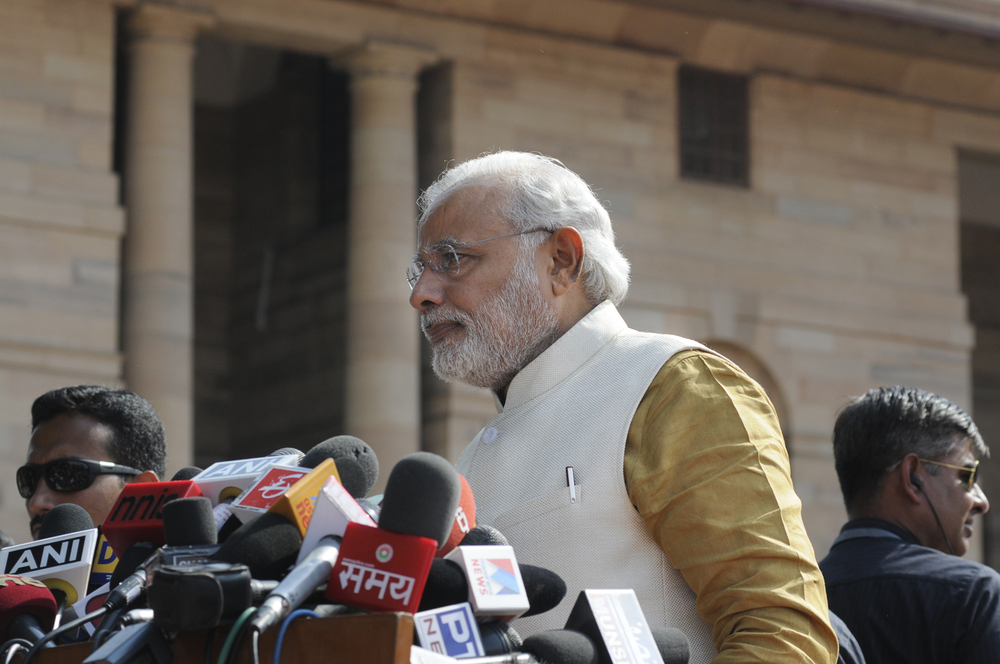
WASHINGTON—In a display of intercontinental unity, President Barack Obama and India’s new Prime Minister Narendra Modi are joining together to put an optimistic face on the future of relations between India and the United States, amid lingering concerns that the close ties the two democracies once enjoyed have lost their lustre.
An Oval Office meeting Tuesday with Obama and Vice-President Joe Biden was to be the centerpiece of Modi’s two-day visit to the White House, where the Indian leader was to be greeted with a formal arrival ceremony outside the West Wing. The previous evening, Obama hosted his Indian counterpart for a private dinner—despite the fact that Modi, a devout Hindu, was fasting.
Typically, visiting heads of state spend just a portion of a day at the White House meeting with Obama and other U.S. leaders. The rare second day of attention from Obama underscored the White House’s desire to give a warm welcome to the man who was once barred from even entering the U.S. Modi was also to attend a State Department lunch Tuesday with Biden and Secretary of State John Kerry.
“Whether it’s security and counterterrorism or strengthening the economy or a host of other regional issues, there is a broad framework where India and the U.S. work closely together to advance our shared interests,” said White House spokesman Josh Earnest.
Now the leader of the world’s largest democracy, Modi was the top elected official in the Indian state of Gujarat more than a decade ago when religious riots there killed more than 1,000 Muslims. When Modi later requested a visa to visit the U.S., Washington said no.
Another potential wrinkle in Modi’s visit: A human rights group is offering $10,000 to anyone who can serve Modi with a summons issued by a federal court in New York to respond to a lawsuit the group filed accusing him of serious abuses.
Modi has denied involvement in the violence, and as a head of state, he’s immune from lawsuits in U.S. courts. White House officials said they doubted the issue would cloud the visit.
During their talks, Obama and Modi will focus on economic growth and co-operation on security, clean energy, climate change and other issues, the White House said. They will also address regional concerns, including Afghanistan, where the U.S. is winding down its 13-year military involvement, plus U.S.-led efforts to combat Islamic State extremists in Syria and Iraq.
While military ties and defence trade between the two countries have grown, the economic relationship has been rockier, with Washington frustrated by India’s failure to open its economy to more foreign investment and address intellectual property complaints. Challenges with an existing civil nuclear agreement and the arrest and strip search last year of an Indian diplomat in New York have further frayed relations.
Ahead of Modi’s visit to Washington, he was given a rock star reception at New York’s Madison Square Garden, where thousands of Indian-Americans flocked for a rare chance to see the new leader. The dazzling Bollywood-style dancers and dozens of U.S. lawmakers that took part highlighted the popular support Modi is enjoying on his first official visit to the U.S. since being elected in May.
A major aspect of this week’s visit is the chance for Obama and Modi to begin building rapport, administration officials said. Obama was among the first Western leaders to telephone Modi with congratulations after his Hindu nationalist Bharatiya Janata Party swept into power after May’s landslide vote.
The visit also is a victory lap of sorts for Modi, a former tea seller.
“He’s gone in just a matter of a few months from persona non grata to person of honour to be received warmly in the Oval Office,” said Milan Vaishnav, who studies South Asia at the Carnegie Endowment for International Peace, a Washington think-tank .
Associated Press writer Darlene Superville contributed to this report.